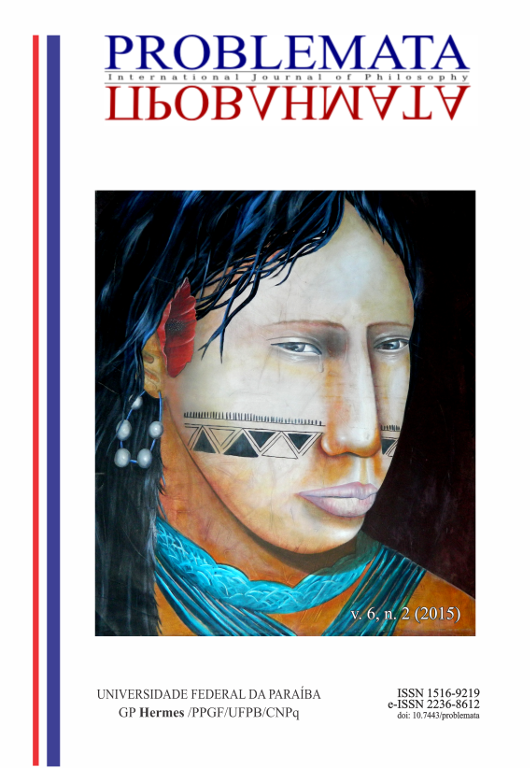EL HORROR A TI DEBIDO: LO INHÓSPITO EN EL ORIGEN DE LA OBRA DE ARTE DE MARTIN HEIDEGGER
DOI:
https://doi.org/10.7443/23310Keywords:
horrible, cosa, diferencia ontológica, verdadAbstract
La tesis principal del articulo es que la verdad del arte, en la conferencia de 1936 “El origen de la obra de arte”, ha de entenderse como lo inhóspito, es decir, como lo horrible o monstruoso de la verdad de ser. En este sentido, se atisbará una diferencia ontológica en el seno mismo de la obra de arte: la obra particular de arte difere de lo que ésta pone en obra, en relación al combate existente entre mundo-tierra, cosa y verdad. Por último, se comprenderá cómo el arte tiene una función propedéutica para con nosotros mismos: transparentar nuestra propia estructura ontológica.
[doi:http://dx.doi.org/10.7443/problemata.v6i2.23310]
Downloads
References
ADRIÁN, Jesús (2010): Heidegger y la genealogía de la pregunta por el ser. Una articulación temática y metodológica de su obra temprana, Herder, Barcelona.
ARISTÓTELES (1999): Retórica, Editorial Gredos, Madrid.
BÜRGER, Peter (1987). Teoría de la vanguardia, Península, Barcelona.
DE MICHELI, Mario (2014). Las vanguardias artísticas del siglo xx, Alianza Editorial, Madrid.
FARIAS, Victor (1989): Heidegger y el nazismo, Muchnik, Barcelona.
FAYE, Emmanuele (2009): Heidegger : la introducción del nazismo en la filosofía: en torno a los seminarios inéditos de 1933-1935,Akal, Madrid.
HEIDEGGER, Martin (2006): Einführung die Phänomenologische Forschung, Gesamtausgabe, II. Abteilung, Band 17, Vittorio Klostermann, Frankfurt a. M.
______. (2005): Phänomenologische Interpretation ausgewählter Abhandlungen des Aristoteles zu Ontologie und Logik, Gesamtausgabe, II. Abteilung, Band 62, Vittorio Klostermann, Frankfurt a. M.
______. (2002): Sein und Zeit, Max Niemeyer Verlag, Tübingen.
______. (1999): Zur Bestimmung der Philosophie 1. Die Idee der Philosophie und das Weltanschauungsproblem (KNS 1919) 2. Phänomenologie und transz Wertphilosophie (SS 1919) 3. Anhang: Über das Wesen der Universität und des akademischen Studiums (SS 1919), Gesamtausgabe, II. Abteilung, Band 56/57, Vittorio Klostermann, Frankfurt a. M.
______. (1992): Plato: Sophistes, Gesamtausgabe, II. Abteilung, Band 19, Vittorio Klostermann, Frankfurt a. M.
______. (1988): Ontologie (Hermeneutik der Faktizität), Gesamtausgabe, II. Abteilung, Band 63, Vittorio Klostermann, Frankfurt a. M.
______. (1976): Logik. Die Frage nach der Wahrheit, Gesamtausgabe, II. Abteilung, Band 21, Vittorio Klostermann, Frankfurt a. M.
______. (1979) Prolegomena zur Geschichte des Zeitbegrifs,II. Abteilung, Band 20, Vittorio Klostermann, Frankfurt a. M.
______. (1977): Holzwege, I. Abteilung, Band 5, Vittorio Klostermann, Frankfurt a. M.[(2010): Caminos de bosque, trad., Helena Cortés y Arturo Leyte, Alianza Editorial, Madrid]
Husserl, Edmund (1999): Investigaciones Lógicas, vol. II, Alianza, Madrid.
______. (1990): La crisis de las ciencias europeas y la fenomenología trascendental: una introducción a la filosofía fenomenológica, Crítica, Barcelona.
LYOTARD, Francois (2008): La posmodernidad (explicada a los niños), Gedisa, Barcelona.
SAFRANSKI, Rüdiger (2003): Un maestro de Alemania: Heidegger y su tiempo, Tusquets, Barcelona.
Schapiro, Meyer (1999): Estilo, artista y sociedad: teoría y filosofía del arte, Tecnos, Madrid.
VOLPI, Franco (2012): Heidegger y Aristóteles, Fondo de Cultura Económica, Argentina.
XOLOCOTZI, Alejandro (2013): Heidegger y el nacionalsocialismo. Una crónica, Plaza y Valdés, México.
Downloads
Additional Files
Published
Issue
Section
License
Authors who publish with this journal agree to the following terms:
- Authors retain copyright and grant the journal right of first publication with the work simultaneously licensed under a Creative Commons Attribution License that allows others to share the work with an acknowledgement of the work's authorship and initial publication in this journal.
- Authors are able to enter into separate, additional contractual arrangements for the non-exclusive distribution of the journal's published version of the work (e.g., post it to an institutional repository or publish it in a book), with an acknowledgement of its initial publication in this journal.
-
- Authors are permitted and encouraged to post their work online (e.g., in institutional repositories or on their website) prior to and during the submission process, as it can lead to productive exchanges, as well as earlier and greater citation of published work (See The Effect of Open Access).





